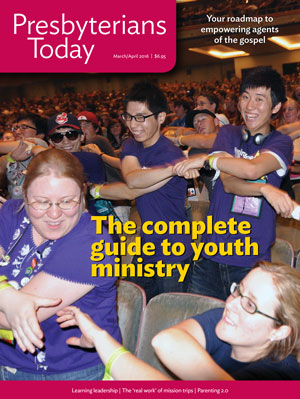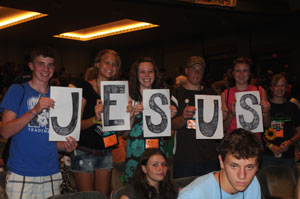 The secret to youth ministry
The secret to youth ministry
Empowering agents of the gospel
by Chanon Ross
It was a hot August night, and Atlanta’s Buckhead Theatre had been reserved for a special gala to honor 15 remarkable teenagers. With the help of GivingPoint, a leading youth philanthropy organization, these youth had launched nonprofit organizations that were addressing significant social problems such as homelessness, teen pregnancy, poverty, and inadequate education. I was eager to talk with them, but so were more than 100 guests in attendance that night. Many of them swarmed the youth like groupies at a rock show, and I quickly realized that getting face time with even one of the young people wasn’t going to be easy.
I tried to edge my way into a conversation with one of the youth and found myself rubbing shoulders with two women who were so focused on him that they were unaware of me. I leaned in and jockeyed for an even better position, really wanting to hear what the young man had to say.
As I surveyed the room, I was struck by the professional profiles of many of the guests. They included successful entrepreneurs, philanthropists, artists, business leaders, academics, city leaders, and the executive directors of many organizations. In other words, they were all busy and important people who were more than happy to spend their Saturday evening talking with teenagers.
It occurred to me that I rarely see such enthusiasm for young people in churches and other ministry organizations. I thought about the hundreds of youth ministers I know who would love to experience such interest and exuberance from adults in their youth ministries.

Participants at the 2013 Presbyterian Youth Triennium reported a significant increase in telling others about their faith.
Unfortunately, most youth ministers have to work very hard to recruit adult volunteers, and they often dread this part of their job. They find themselves on the phone, holding the church directory, hoping to reach someone who will agree to help with an activity: “Hello, I’m really sorry to bother you, but the youth lock-in is tomorrow night, and we really need two more chaperones.” Adults who agree to help may only do so out of obligation or because no one else will do it.
It’s easy to understand this lackluster interest. Busy, talented, and capable adults don’t generally get excited about chaperoning events or attending youth committee meetings. But disinterest in such activities is not the same as disinterest in teenagers themselves.
Congregations are full of people who, like those at the GivingPoint gala, care immensely about young people. They have gifts, experiences, and wisdom that they would love to share with young people. And passionate, idealistic youth have much to offer them in turn. Adults at the GivingPoint gala, for example, were inspired by committed youth who were serving and making a difference in their communities. Such passion can energize and encourage congregations.

Youth on a mission trip help build a house in the Mississippi Delta. The trip was organized by Jann Treadwell, while serving a church in Dallas.
Youth love mission trips and other opportunities to make a difference in the lives of others. They see the interconnectedness of the world and readily understand how they can be part of causes thousands of miles away, such as water scarcity in Africa or international human trafficking. They need adults who can help them connect with resources, acquire important skills, and implement a plan. More importantly, they need adults who can mentor them, speak into their lives, and help them understand their desire to change the world as a gift of the Holy Spirit.
It is almost impossible to overstate how important meaningful relationships with adults are for the spiritual formation of young people. They need to see Christian faith come alive in people they respect and trust, and they need to develop relationships with key adults whose examples they can follow. It may take a village to raise a child, but it takes a church to raise a teenager.
Finding new and meaningful ways to connect youth and adults requires a complete rethinking of one of youth ministry’s most fundamental principles, which is that youth ministry is about youth.
While youth have always been part of congregational life, youth ministry is a relatively new phenomenon. Youth ministry, as we typically think of it, came into existence in the 1940s and ’50s as youth culture became a more prevalent part of society. Emerging theories of adolescence convinced church leaders of the need for youth-specific programming and for educational resources attuned to the specific needs of teenagers.

At the 2010 Presbyterian Youth Triennium, thousands of participants remembered their baptism into the body of Christ.
Over time, congregations adopted the “youth group” model and hired youth ministers. These youth ministers purchased youth-specific curricula and study Bibles, and before long, youth ministry conferences became a primary way for them to learn about new resources and opportunities. Eventually, seminaries and divinity schools began providing youth ministry degrees and other training programs that focused on adolescent psychology, youth culture, parent-teen relationships, and other issues. Some schools even launched PhD programs to train scholars for the emerging field.
Decades of research and programming have taught the church about the spiritual, developmental, and educational needs of youth. However, all of this focus on the needs of youth has had the unintended consequence of making youth objects of ministry rather than agents of ministry.
In other words, the invention of youth ministry has, over time, tended to treat youth as recipients of ministry rather than as doers of ministry. Empowering youth to be agents of ministry means seeing them as apprentices who must learn to connect their particular gifts and abilities with the larger mission of the church. However, empowering youth cannot be the sole responsibility of a youth minister; other adults have to step up too.
Of course, if we are going to ask adults to invest in youth, then youth ministers and other church leaders need to present them with requests that are compelling. Congregations are brimming with adults who have remarkable abilities, knowledge, and experience, but chaperoning the youth lock-in (for example) might not be the best use of an adult’s time and abilities. Think creatively. Some adults are not very good at leading Bible studies or playing games, but that doesn’t mean they can’t make an invaluable contribution.
For example, when I served as the youth minister of a large Presbyterian church in Chicago, an accountant in our congregation approached me one day and casually observed, “You’re good at relating to the kids, but you’re not very good at accounting.” Although I didn’t want to admit it, I knew she was right. Our youth ministry and mission budgets were complex, and managing them was not something I did well. She gladly took over the accounting, and she also invited one of the youth, a senior who was an aspiring accountant, to help her.
Watching and helping a master accountant employ her skills for the sake of the church was a deeply formative experience for that youth. Through the life of a generous and caring adult, the youth saw how burgeoning interests in accounting could advance the gospel and serve the world. Congregations are fertile ground where many such relationships can be cultivated and thrive. Creating these relationships is the heart and soul of youth ministry.
Confirmation is a great opportunity. A few years ago, a confirmation teacher came to me because one of her students, an eighth-grade boy, was causing problems.
I prepared myself for the usual litany of complaints. Talking too much. Being on his phone. Not doing his homework.
“Is he being disruptive?” I asked the teacher. She hesitated pensively for a moment and then said, “He’s frustrated because he thinks Christianity is too easy. He keeps complaining that ‘Christianity must be the easiest religion in the world.’ ” This spirited young soul wanted his faith to challenge him, and the American middle-class Jesus he was receiving in our confirmation class just wasn’t cutting it.
He was convinced that faith should demand something of him, and he was equally convinced that it needed to matter in the lives of his mentors and teachers.
Adults who embrace the gift of sharing their lives with youth will often find their world turned upside down by the kingdom of God. Confirmation is one place where adults and youth can explore this together, a place where adults can be transparent and let youth see them wrestle with what it means to be counted among the baptized. In other words, confirmation is an opportunity for both youth and adults to examine their faith together and confirm (and reaffirm) their membership in the body of Christ.
But there’s a problem.
Many churches are not sure what to do with confirmation, which can feel routine—something that just happens because of a young person’s age. Many youth ministers struggle with confirmation students who participate out of obligation or parental insistence. It is common for youth to complete confirmation only to disappear from the life of their faith community.
The Confirmation Project is a new grant initiative of the Lilly Endowment that is helping churches assess their confirmation programs. An expert team of researchers is investigating the practices of five mainline congregations—the Presbyterian Church (U.S.A.), the African Methodist Episcopal Church, the Evangelical Lutheran Church in America, the United Methodist Church, and the Episcopal Church. The project is co-directed by a faculty member and a recent Ph.D. graduate of Princeton Theological Seminary.
More info sidebox
Learn more
To participate in free webinars and get the latest insights from the Confirmation Project’s research: theconfirmationproject.com
Do you know a high school student who wants to be an agent of ministry? The Youth Philanthropy Academy is a new program at Princeton Theological Seminary that partners with congregations to help youth launch their own nonprofits: iym.ptsem.edu
Pastors and ministry leaders can access this research at no cost and participate in live webinars with the researchers. And because the Confirmation Project’s research is ongoing, churches can participate in surveys and contribute to the insights that are emerging.
The Confirmation Project is what ministry leaders need to do: “traditioned innovation.” Through research, listening to our youth, and prayer, ministry leaders can discern which traditional practices are the most effective as well as where innovation needs to take place.
Ultimately, adults and ministers who nurture vital relationships with youth are engaged in hope. Much is said today about the decline of Christianity and of mainline churches in particular, but young people are excited about the future. They see what is possible, and they want that same hopeful vision in us—in ways that empower them to be agents of the gospel.
Chanon Ross is the director of the Institute for Youth Ministry at Princeton Theological Seminary.


